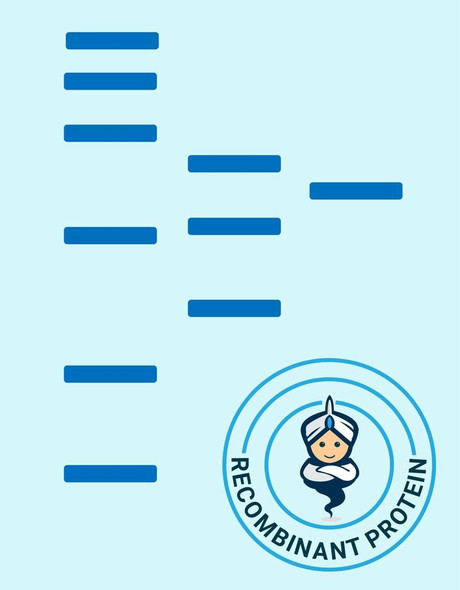Human MIP 3a Recombinant Protein (RPPB1226)
- SKU:
- RPPB1226
- Product Type:
- Recombinant Protein
- Species:
- Human
- Uniprot:
- P78556
- Research Area:
- Chemokines
Description
| Product Name: | Human MIP 3a Recombinant Protein |
| Product Code: | RPPB1226 |
| Size: | 10µg |
| Species: | Human |
| Target: | MIP 3a |
| Synonyms: | S Small inducible cytokine A20 precursor, CCL20, Macrophage inflammatory protein 3 alpha, MIP-3-alpha, Liver and activation- regulated chemokine, CC chemokine LARC, Beta chemokine exodus-1, CKb4, LARC, ST38, MIP3A, MIP-3a, SCYA20. |
| Source: | Escherichia Coli |
| Physical Appearance: | Sterile Filtered colorless solution. |
| Formulation: | The MIP 3a solution (0.25 mg/ml) contains Phosphate Buffered Saline pH7.4 and 10% glycerol. |
| Stability: | Store at 4°C if entire vial will be used within 2-4 weeks. Store, frozen at -20°C for longer periods of time.For long term storage it is recommended to add a carrier protein (0.1% HSA or BSA).Avoid multiple freeze-thaw cycles. |
| Purity: | Greater than 85.0% as determined by SDS-PAGE. |
| Amino Acid Sequence: | MGSSHHHHHH SSGLVPRGSH MASNFDCCLG YTDRILHPKF IVGFTRQLAN EGCDINAIIF HTKKKLSVCA NPKQTWVKYI VRLLSKKVKN M |
CCL-20 is a chemotactic factor that draws lymphocytes & neutrophils, rathar than monocytes. MIP-3 alpha inhibits proliferation of myeloid progenitors in colony formation assays. MIP3A plays a role in the formation and function of the mucosal lymphoid tissues by attracting lymphocytes and dendritic cells towards epithelial cells. C-terminal processed forms have been shown to be equally chemotactically active for leukocytes. CCL-20 holdes antibacterial activity e.coli atcc 25922 and s.aureus atcc 29213. CCL-20 gene transcription is activated by H. pylori, which activates NF-kappaB through intracellular signal pathway which involves IkappaB kinase and NF-kappaB-inducing kinase. MIP-3 alpha is invloved in chemokine-mediated lymphocyte trafficking during gastric inflammation in Helicobacter infection. CCL-20 expression is involved in the recruitment of CD45R0-positive T cell subsets into the intestinal lamina propria. MIP-3A is in charge of the advancement of pulpal inflammation through the recruitment of C-C motif Receptor 6-expressing lymphocytes Vaginal epithelial cells respond to factors present in semen by secreting MIP-3 alpha, which increases langerhans cells recruitment during HIV transmission.
MIP 3a Human Recombinant fused with a 21 amino acid His tag at N-terminus produced in E.Coli is a single, non-glycosylated, polypeptide chain containing 91 amino acids (27-96 a.a.) and having a molecular mass of 10.3kDa. The MIP 3a is purified by proprietary chromatographic techniques.
| UniProt Protein Function: | CCL20: Chemotactic factor that attracts lymphocytes and, slightly, neutrophils, but not monocytes. Inhibits proliferation of myeloid progenitors in colony formation assays. May be involved in formation and function of the mucosal lymphoid tissues by attracting lymphocytes and dendritic cells towards epithelial cells. C-terminal processed forms have been shown to be equally chemotactically active for leukocytes. Possesses antibacterial activity E.coli ATCC 25922 and S.aureus ATCC 29213. Belongs to the intercrine beta (chemokine CC) family. 2 isoforms of the human protein are produced by alternative splicing. |
| UniProt Protein Details: | Protein type:Chemokine; Secreted; Secreted, signal peptide; Motility/polarity/chemotaxis Chromosomal Location of Human Ortholog: 2q36.3 Cellular Component: extracellular space; extracellular region Molecular Function:protein binding; chemokine activity Biological Process: cell-cell signaling; wound healing; defense response to bacterium; immune response; chemotaxis; inflammatory response; signal transduction; positive regulation of interleukin-1 alpha biosynthetic process; positive regulation of nitric-oxide synthase biosynthetic process |
| NCBI Summary: | This antimicrobial gene belongs to the subfamily of small cytokine CC genes. Cytokines are a family of secreted proteins involved in immunoregulatory and inflammatory processes. The CC cytokines are proteins characterized by two adjacent cysteines. The protein encoded by this gene displays chemotactic activity for lymphocytes and can repress proliferation of myeloid progenitors. Two transcript variants encoding different isoforms have been found for this gene. [provided by RefSeq, Sep 2014] |
| UniProt Code: | P78556 |
| NCBI GenInfo Identifier: | 2829668 |
| NCBI Gene ID: | 6364 |
| NCBI Accession: | P78556.1 |
| UniProt Secondary Accession: | P78556,Q53S51, Q99664, |
| UniProt Related Accession: | P78556 |
| Molecular Weight: | 10,691 Da |
| NCBI Full Name: | C-C motif chemokine 20 |
| NCBI Synonym Full Names: | chemokine (C-C motif) ligand 20 |
| NCBI Official Symbol: | CCL20�� |
| NCBI Official Synonym Symbols: | CKb4; LARC; ST38; MIP3A; Exodus; MIP-3a; SCYA20; MIP-3-alpha�� |
| NCBI Protein Information: | C-C motif chemokine 20; CC chemokine LARC; beta chemokine exodus-1; small-inducible cytokine A20; macrophage inflammatory protein 3 alpha; liver and activation-regulated chemokine; small inducible cytokine subfamily A (Cys-Cys), member 20 |
| UniProt Protein Name: | C-C motif chemokine 20 |
| UniProt Synonym Protein Names: | Beta-chemokine exodus-1; CC chemokine LARC; Liver and activation-regulated chemokine; Macrophage inflammatory protein 3 alpha; MIP-3-alpha; Small-inducible cytokine A20Cleaved into the following 3 chains:CCL20(1-67); CCL20(1-64); CCL20(2-70) |
| Protein Family: | C-C motif chemokine |
| UniProt Gene Name: | CCL20�� |
| UniProt Entry Name: | CCL20_HUMAN |










